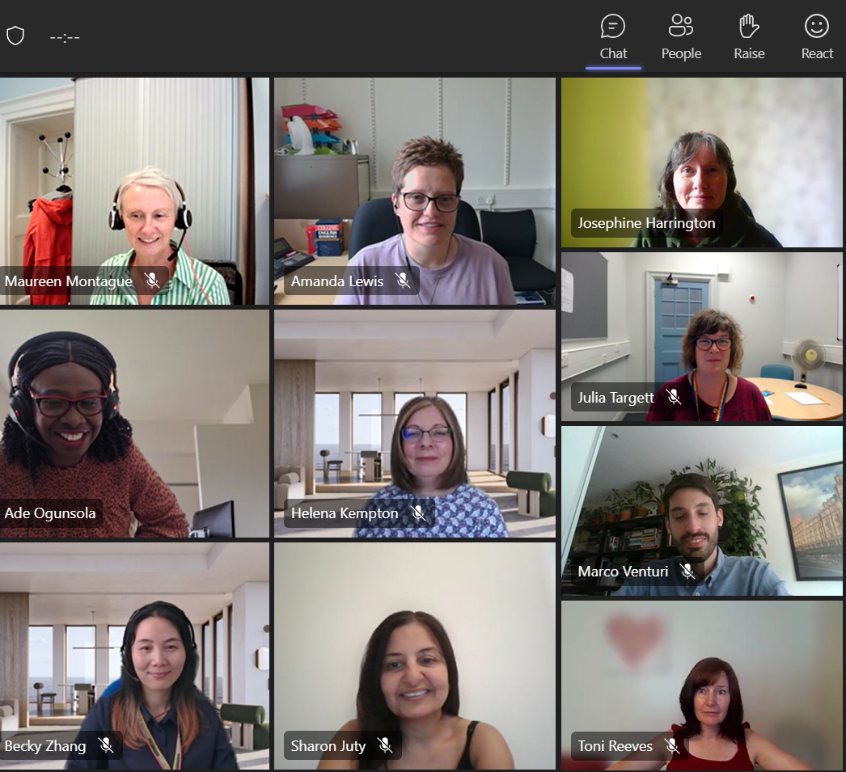Our aims:
- To raise awareness of menopause at the University of Greenwich.
- To encourage open conversation about menopause and break the taboo.
- To provide access to information, support and resources.
- And support all staff, line managers and anyone directly or indirectly impacted by the menopause.
Click on the links below to find out more.
The Menopause Team
The university’s Menopause Team are Anna Radley, Vanessa Roots, and Ratnes Alahakone. We have always wanted to make a difference to the lives of people who are experiencing menopausal symptoms through breaking the taboo, normalising the conversation about menopause and by providing support and information within the workplace. We are passionate about raising awareness of the menopause and supporting our colleagues at the university and beyond.
 |  |  |
|---|---|---|
Anna Radley Head of Learning and Performance, People Directorate | Vanessa Roots Senior Workforce Policy Officer, People Directorate | Ratnes Alahakone Senior Lecturer in HRM, Greenwich Business School |
Scroll down for information, support, and resources and to find out more about our ongoing work and accreditation as a ‘menopause friendly’ university.
Menopause Friendly Accreditation
We are proud to be accredited as a Menopause Friendly Employer and the first university in England to achieve this standard. The Menopause Friendly Accreditation, established by Henpicked: Menopause In The Workplace (www.menopausefriendly.co.uk), recognises high standards and proven practices that embrace menopause in the workplace.
The Menopause Friendly Accreditation is industry-recognised and the only accreditation that sets clear standards which must be met. As such, it is truly meaningful and considered by many as a mark of excellence for menopause in the workplace.
Independently accredited menopause friendly employer
University Menopause Guidance
The university’s Menopause Guidance sets out the university’s approach to supporting staff who are affected by the symptoms of perimenopause and menopause and provides the tools for line managers to support their staff. If you need to know more about the menopause and how to get support at work this is a good place to start.
The guidance also contains helpful links to internal and external resources and support.
What is the menopause?
Menopause
Menopause is the stage in a woman’s life when menstruation has stopped, following 12 consecutive months without a period. The biological change causes hormone levels to drop dramatically, in particular Oestrogen and Progesterone, causing symptoms which are wide ranging, can fluctuate and change and can last for several years. Menopause usually happens between the ages of 45 and 55 with the average age being 51 in the UK, but for some it can happen earlier or later than this, due to surgery or for other reasons.
Perimenopause
The time leading up to menopause is known as perimenopause, when symptoms can start to appear, often in the early to mid-forties.
Symptoms
The symptoms during the perimenopause and menopause can have a significant impact on some women in their everyday lives, affecting their working lives too. 8 in 10 women of menopausal age are in work and 3 in 4 women experience symptoms to some extent with 1 in 4 experiencing more serious symptoms.
There are many symptoms, both physical and psychological, including night sweats, hot flushes (sudden feelings of hot or cold spreading through the body to face, neck and chest which can also make you dizzy), low mood, anxiety, difficulty sleeping, headaches and migraines, muscle aches and joint pain, dry and itchy skin, mood swings, and problems with memory or concentration (brain fog). The type, severity and duration of symptoms will be different for everyone.
See our support and resources section for help with managing symptoms.
Whilst we often refer to ‘women’ experiencing the menopause, our colleagues who are non-binary or trans may experience the menopause and its associated symptoms whilst not identifying as a woman or female. This website and its content are inclusive of all members of staff at the university regardless of their gender identity.
Menopause Champions

Our team of 25 volunteer Menopause Champions are located across the university and provide localised support by signposting to helpful information and resources and providing a listening ear for colleagues and managers.
Support and resources
UoG Menopause Awareness Training (online)
The Menopause Team deliver termly awareness training sessions. Colleague training is for all staff whilst the line manager training is tailored towards helping managers to support their people. Look out for email notifications for this online training and sign up via Horizon.
You can also view this 5 minute menopause training video ‘Let’s talk about menopause’.
Menopause Cafes
What is a menopause café?
These are very informal but informative online sessions, hosted by the menopause team, open to all university colleagues (all genders, ages, backgrounds, managers and non-managers) and anyone who wants to hear, learn or talk about menopause. These sessions usually last around an hour and focus on a specific topic or symptom, followed by open and informal chat. These sessions are always a confidential, safe and supportive space and ‘what is said in the menopause café, stays in the menopause café’!
Look out for a diary invite to the next café, grab a cuppa and come along.
Menopause Teams Hub
Join the menopause community on our Teams channel for regular updates on upcoming events, connect with colleagues, ask questions and share tips and advice.
Confidential support
If you would prefer to talk to someone confidentially about the menopause, you can also get in touch at menopause@gre.ac.uk. This inbox is monitored by our menopause team.
Employee Assistance Programme (EAP)
The university’s Employee Assistance Programme (EAP) offers 24/7 support to all staff and their families. Colleagues can be referred for counselling for concerns arising from menopause including stress, anxiety, and depression. The EAP website has a dedicated page with supporting materials on menopause. Further information can be found on the university staff portal.
Events
We were delighted to welcome back Carolyn Harris, MP for Swansea East to the university for a third time in October 2023, when she delivered another session on the ‘Menopause Revolution’, updating us all on the ongoing work she is doing to drive menopause awareness and change in parliament. Links to previous webinars are below.
On 13 May 2022, Caroline Noakes, MP for Romsey and Southampton also joined us to deliver a webinar to the university on her role as Chair of the Women and Equalities Committee in Parliament.
- Menopause Revolution Webinar - 22 October 2021
- Menopause Revolution Webinar - 21 October 2022
- Menopause Webinar with Caroline Noakes MP
World Menopause Day - 18th October 2024
Look out for further information on our upcoming events for this year's World Menopause Day.
Scroll down for upcoming Events and further support, information and resources listed under Articles and Documents.
Academic research
We are currently conducting academic research into the impact of the university’s menopause support on colleagues, and this will inform further development of our ongoing work at the University of Greenwich. We shall report our findings in due course.
Events
Celebrating International Women’s Day
International Women’s Day (IWD) on 8 March is a global day to celebrate women’s achievements and a call to action for accelerating gender equality. For more than a century (since the first IWD in 1911), it has brought people together across countries and communities to imagine a gender equal world: one free of bias, stereotypes and discrimination, where difference is valued and celebrated.
Each year, IWD has themes to inspire action. In 2026, the themes are “Give to Gain” (#GiveToGain) which is a reminder that when we give – our time, knowledge, visibility, advocacy or support – we all gain. Giving is not a subtraction but a multiplication: when women thrive, everyone rises. The UN theme is Rights. Justice. Action. For ALL women and girls. Which highlights the urgent need for fair, inclusive and accessible justice for every woman and girl. Too many barriers still exist, from discrimination and bias to systems that don’t meet women’s needs.
So how does this relate to menopause and menstruation? For too long, menopause and menstruation have been overlooked in workplaces, leaving many women without the support they need at a critical stage in their life and career. By giving space for open conversations, giving recognition to lived experiences and giving practical support, organisations can create environments where colleagues feel valued and able to thrive at every stage of life. In return, we gain stronger teams, greater inclusion and workplaces where everyone can succeed.
As we celebrate women everywhere, let’s also remember that supporting menopause and menstruation at work is part of building true equality. Together, we can create a workplace where every colleague has the opportunity to flourish.
This March, we’ll be celebrating International Women’s Day by providing events associated with menopause and menstruation and also wider themes. These are as follows:
- Menstrual Health Awareness Training for Colleagues on 10 March 2026 from 14:00 – 15:00. This session will be delivered on Teams. Please book your place on the session via Horizon Learning
- Menstrual Health Awareness Training for Managers on 9 March 2026 from 14:00 – 15:00. This session will be delivered on Teams. Please book your place on session via Horizon Learning
- Menopause Webinar – the lived experience on 10 March 2026 from 13:00 – 13:45 where colleagues will share their experiences of living with menopause symptoms and how they overcame them. They will focus on topics including energy levels, mental health and anxiety and the use of HRT. Please join the webinar in Teams
- Let’s talk about periods café – Endometriosis on 18 March from 13:00 – 13:45. Find out more about endometriosis at this informative café to acknowledge Endometriosis Awareness Month in March. Please join the webinar here
Wider events:
- Book Swap and Connect - the Menopause Champions are joining with the Wellbeing Network’s Connect Cafes and the EDI Building Belonging Staff session with a book swap. Come along to one of these sessions with a themed book about women, an autobiography, a factual book about women’s health or novel where the main character is a woman and connect with others about the book. If you wish, you can swap books at the end of the session.
Dates: EDI Building Belonging session on 10th March from 15.30 – 16.30 in Avery Hill Campus in Grey 104.
Greenwich Connect Café will take place on Wednesday 11th March from 10.30 – 12.30 in the Queen Mary Café.
Medway Connect Café on 17th March from 11.00 – 12.00 in the Drill Hall Library
HSBC are offering a series of financial webinars to celebrate International Women’s Day. The webinars are provided free to anyone who wishes to attend, and no financial advice will be given during the event. Advice and views are HSBC's, not the University’s. As a consequence of these webinars, it is the individual’s choice to engage with any services or products.
They webinars are as follows:
- Women & Wealth on Wednesday 11 March from 11.00 – 12.00
While women have made remarkable progress in narrowing workplace gaps, many still find themselves trailing men when it comes to investing in their long-term financial wellbeing. This session is designed to spark confidence and encourage open, honest conversations about money—conversations that can benefit the whole family. Book onto the session here
- Savings & Investing on Wednesday 18 March from 11.00 – 12.00
Financial independence is a cornerstone of personal empowerment, and for women, saving and investing are essential steps toward achieving long-term security and flexibility. Whether planning for life’s milestones, unexpected events, or retirement, building financial resilience can help women navigate changing circumstances with confidence. By taking proactive steps to manage their finances, women can create opportunities for themselves and their families and help close the gender wealth gap. Book onto the session here
- Thriving in retirement on Thursday 26 March from 11.00 – 12.00
Retirement marks an exciting new chapter, but navigating the transition can raise plenty of questions. In this session, we’ll take a high-level look at the key considerations as you approach retirement. We’ll explore topics such as pension withdrawal options, the timing of seeking financial guidance, different types of retirement income, and important factors in legacy planning. Book onto the session here
- Tax Optimisation on Monday 30 March from 12.00 – 13.00
Are you looking to better understand your tax allowances and the options available to you? Join us for an informative session where we’ll explore the landscape of tax allowances, demystify common misconceptions, and highlight how tools such as pensions and ISAs can play a role in your financial planning. We’ll also discuss the value of seeking professional guidance and how it can complement your own research and decision-making. Book onto the session here
